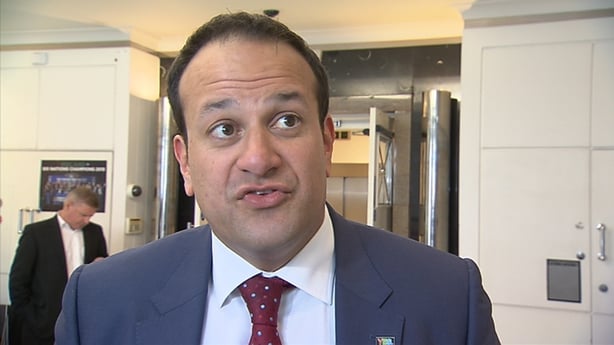Minister for Health Leo Varadkar has said it is “indefensible” that any patient is forced to spend more than 24 hours in an emergency department.
The Minister said it was not fair to blame individual staff members at Tallaght Hospital, or Health Service Executive managers, after a 91-year-old man was left on a trolley there for more than 29 hours.
Mr Varadkar said such a scenario was, unfortunately, not an isolated incident.
He said that on any given day, there could be 30 or 40 people spending more than 24 hours on trolleys, most of them elderly.

Speaking on RTÉ’s News at One, Mr Varadkar said he rang the patient at Tallaght Hospital to speak to him about his experience, as he had been hearing different accounts about his treatment.
He said the man told him he was happy with the standard of care he received at the hospital, and said that reports that he was subject to noise and light torture were not true.
He said the man felt that his patient experience had been misrepresented.
Mr Varadkar continued: "We will never have a perfect health service in which everyone gets the level of healthcare that they may want or expect or are entitled to.
"And problems like this are problems that affect all countries all over the world to one extent or another.
"What we can do though, is continually, as best as possible, do everything we can to improve the situation and to make instances such as this less likely."
The HSE has said there will be a report in the coming days on the reasons why the man was left on a hospital trolley for such a long time, but said that obviously the emergency department was under pressure.
National Director for Acute Hospitals with the HSE Liam Woods said a further 16 beds would be opening in the hospital soon.
Speaking on RTÉ’s Morning Ireland, he said: "Clearly the experience was unacceptable. For our point of view the focus has to be how to improve that and what are we doing to make a difference over the course of this winter."
He said that the HSE has engaged in an extensive winter planning process.
Mr Woods said there would be a gradual opening of 420 beds nationally to help support the hospital system and an investment of €74m in the Fair Deal scheme.
When asked why the situation was getting worse, Mr Woods said the population was aging and this was placing an increasing stress on the health system.
Mr Woods also said the hospital would have to look at how the information came into the public domain.
He said it was important that patient confidentiality be respected.
Minister of State at the Department of Health Kathleen Lynch said there should be a special liaison officer such as a staff nurse to deal with vulnerable groups, such as the elderly and those with learning difficulties, when they come into emergency departments.
"I've always believed and still would, and make the argument regularly, that when different vulnerable groups come into emergency departments that there should be a designated person to deal with that vulnerable group,” said Ms Lynch.
“It's very easy when you're voiceless to get lost in the chaos that sometimes ensues in our emergency departments."
Meanwhile, a spokesperson for the Irish Association for Emergency Medicine has said the Taoiseach is being disingenuous in suggesting the case at Tallaght Hospital is unique.
Dr Fergal Hickey said similar cases happen in hospitals all around the country every week.
He said it is a problem that has been escalating for the past 15 years.
He said the Government was penalising hospitals who do not carry out enough elective activity while simultaneously criticising them for failing to provide beds to other patients when there are not enough beds to go around.
"This Government has imposed fines on hospitals for failing to meet scheduled activity targets. So on the one hand they're saying this is unacceptable, and it is, but on the other they're penalising hospitals who don't do enough elective activity in an environment in which we simply don't have enough bed capacity."
Dr Hickey said that some money and beds have been made available but the necessary staff are not in place.
"The recruitment processes are particularly slow and painful and not alone that but many of those we that would seek to recruit to staff those beds have emigrated and left the country."
Irish Nurses and Midwives Organisation General Secretary Liam Doran has said that overcrowding has never been greater than it has been this year and not enough is being done to address it.
Mr Doran said that the INMO wants extra beds to be opened but said the hospital does not have adequate staff to deal with the current beds and cannot open the new beds without additional staff to service them.
Speaking on RTÉ’s Today with Sean O’Rourke that international and UK campaigns to incentivise people to take up nursing jobs in Ireland have not been successful.
Mr Doran said a recent work-to-rule in St Vincent’s University Hospital had led to fewer patients on trolleys because management applied a 24/7 focus on the situation.
Mr Doran said solving the crisis would require significantly curtailing elective surgeries.

